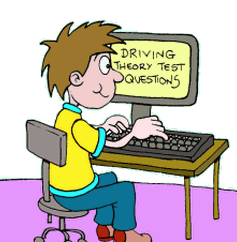Nervous Driver Tips
Many people who learn to drive have a combination of nerves and excitement. Even if someone says they have no nerves and are perfectly confident when it comes to driving, the first time you get behind the wheel and move the vehicle you are bound to feel nerves, and possibly as mentioned some excitement.
Sometimes people tell themselves that they are nervous and expect to be nervous, and this gets the better of them. The main course of nerves is not feeling in control, or worrying about your own ability.
So it is essential to remember that no-one is able to drive safely from day one - that's the point of lessons, gradually getting better as you build up experience at driving on the roads, getting used to the car, the controls, the space around the car, road conditions, reacting to other drivers, learning to control the vehicle through use of the gears, using the mirrors, signalling, reversing and so on and so forth.
Many nervous drivers also have the character trait of over-analysing how they are doing, and what they are doing. Being aware of your own performance is of course a good thing, but do not analyse to the detriment of yourself by making yourself super nervous.
Assuming you are learning with a driving school, then you will be with a qualified and experienced instructor, and most likely in a dual control car too, so try to put your trust in that person to give you honest feedback on your performance and many instructors are experienced at working with nervous drivers because the fact is many people learning to drive ARE nervous.
There are also driving instructors who specialise in nervous drivers, so if this is you then perhaps you could consider one of those driving schools that specify this in their advertising material. Above all, as you learn to drive and get better at driving, get more used to it, and it becomes more routine and familiar then many drivers report that the nerves do melt away.
Related Articles...
Vulnerable road users - pedestrians
Pedestrians whether old or young are all potentially vulnerable. Any impact at all on a pedestrian is potentially fatal, and that goes for a pedestrian of any age.
Of course within the class...
Online Driving Theory
Why use an online driving theory website when there are also some books in publication that will help you study for your theory test? Well, there are several advantages to online driving theory,...
What to do at a box junction
The box junction is quite common but despite this there are a whole wide range of ways in which different drivers interpret what they are supposed to do at them so you will see different behaviours...
The different types of tyre and maintenance
You might tire of talking about tyres, but these are extremely important elements of your car, being the only part that touches the road.
And they need to be in good working order to do their...
Motorway Driving Tips
Driving on a motorway for the first time can be both exciting and a little daunting - exciting as it is something new whilst daunting as you won't have experienced driving on a motorway before...
Switching to driving an automatic
When you switch to an automatic car it could be for a wide range of reasons. Of course number one on that list could be that you are simply given an automatic car or you are driving in a country...
The day of the theory test
On the day of the theory test you may well feel nervous. As with any test or examination of any kind this is of course natural as everybody is anxious to do their best and to pass the...
Theory test case studies
One of the relatively new elements added to the driving theory test is what is called the case study element. This was introduced on 28th September 2009, and there is one case study in the theory...
The automatic car explained
In most cases, you will learn to drive with a car that has gears in the United Kingdom.
However there are people who prefer to learn in an automatic car, and there are various driving schools...
Professional driving instructors
When you learn to drive, you have the choice who teaches you. The majority of people decide to learn through a professional driving instructor and often through a major school of...
Back to home page of driving theory test questions

